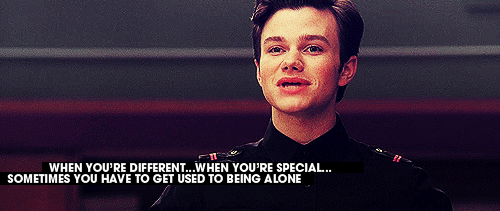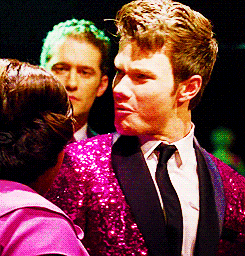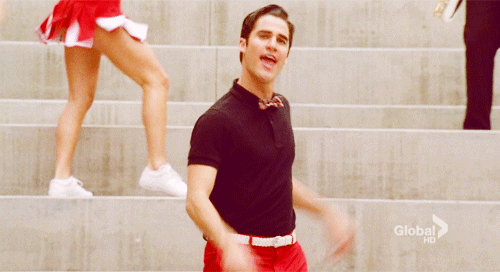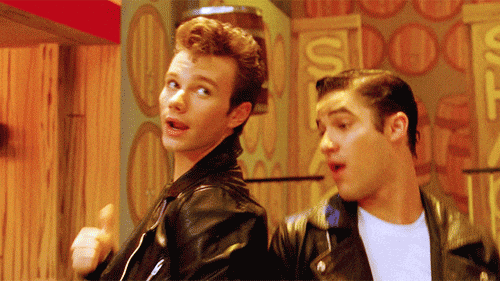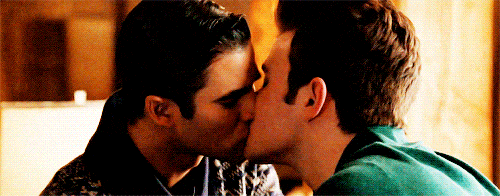Back in May of 2009, a television show by the name of “Glee” created by Ryan Murphy became an instant hit among viewers worldwide. The show attempts to attract all sorts of audiences, primarily in the ages through teenagers and adults with comedy, musical numbers, romance, and controversial themes. While becoming a big hit, it gained a lot of viewers who took experiences being portrayed on the show to heart and look at the show as an inspiration or guidance in their own life. Even so, of course, there were many people who took some of the situations to heart in a more negative way, feeling as though the show glorifies stereotypes or is an overall extremely campy show. In this article, I will be discussing both the pros and cons specifically in the portrayal of male gay characters in the show and how it impacts society.
To start off, let’s address the biggest and most obvious game changer of the show: Kurt Hummel. Kurt, played by Chris Colfer, is a closeted teenage boy with a flamboyant attitude and style of clothing who joins Mckinley High’s glee club with his countertenor voice. This character is constantly being harassed and tormented both physically and verbally because of both his appearance and high-pitched voice. The actor who plays the role himself had similar experiences to Kurt’s, himself also being a closeted homosexual. “I was just embarrassed. Because, I mean, I’d walk by some people that I barely knew in the hallway and they’d scream profanities at me that I didn’t think were true at the time. And of course everyone else in the hallway would laugh. And of course I had some amazing, legendary comebacks…But it’s just embarrassing, and it’s uncalled for. Especially when they don’t know you and you don’t know them. And I was a really, really good kid. I mean, I wasn’t necessarily the best student, but I was a fantastic kid and it just was heart-wrenching. It was heartbreaking”. Many teenagers really connected to this character because of personal experiences which is why the character started out as an extremely popular character. While there have already been many portrayals of gay men on television before such as Will on “Will and Grace”, "Glee’s" portrayal ended up being a very big deal compared to the others because it revealed more of the dangers and disturbances that came with every day life of being gay. This character attracted many people in the LGBTQ community in which many found comfort in the character, knowing that they are getting some representation. The character eventually comes out and takes pride in being openly gay, giving viewers the courage in accepting themselves. Even after coming out, the show successfully keeps the “unsafe” reality that Kurt experiences from the beginning. Colfer delivers a phenomenal performance in presenting the raw and heart-wrenching emotions that so many people connect to and find this character to be one of the biggest role models due to his strive and strength to push forward in life, while in a constant battle with societal views.
The show also provides a solid representation of how a parent should handle a situation such as Kurt’s. Kurt’s father, Burt Hummel, played by Mike O’Malley, is a single parent due to his wife’s death when Kurt was very young. Portraying a very “manly” appearance and attitude along with being a mechanic, he is the complete opposite of his son’s feminine lifestyle. The show manages to properly show how a parent should respond to their children should they come out to them. The response the Burt gives Kurt is that he always knew and still loves him regardless. This was a huge moment in the show, revealing an emotional and beautiful scene between father and son. Regardless of how extremely different they are, Burt continuously throughout the show gives unconditional support for his son. There is one scene in particular that caught many people’s attention in this subject manner. When Burt starts dating one of the main characters, Finn Hudson’s (Corey Monteith) mother, all of which was set up by Kurt because he wanted to get closer to Finn since he had a crush on him, the Hudson’s move into the Hummel’s house with Finn rooming with Kurt. When Kurt decides to redecorate the room in a more feminine style, Finn retaliates using harsh language, including using the word “fag”. Burt barges into the room and defends Kurt and shames Finn for using that word under his roof. Burt acknowledges his past in using that word when was a teenager as well, but now knows better and will not tolerate it especially towards his own son. This was a powerful moment in which Burt puts his relationship on the line by refusing to let Finn move into the house in order to keep his son safe. This became an eye opener for many parents with gay children. This portrayal of parenting is one that is never really seen on television. It creates a new outlook on how these situations should truly be handled and shows how a family should care for their child regardless of who they are or like.
While the show does well in executing the theme of struggle in the gay community, it also has its flaws. Kurt Hummel is what many view as the stereotypical gay: a white, flamboyant, fashionable, musical loving, twink male. Having this be the first visible representation of a homosexual on the show whilst it being a widely viewed show at that, it does not give an accurate and diverse lens to the subject. The show as a whole is extremely whitewashed, with only a few people of color whose story lines are rarely the main attraction. With such little diversity, it takes away some of the more realistic perspectives on the subject. That is not to say that there are not people out there who are of those same characteristics as Kurt’s, but that view of gay men is extremely stereotyped and does not give a proper representation of the community as a whole. This provides a very singular and “boxy” perspective of gay men.
This theme is seen again when Kurt becomes infatuated with his eventual boyfriend, Blaine Anderson. Played by Darren Criss, Blaine is the lead singer of his glee club, The Warblers at Dalton Academy, in which Kurt transfers to so that he can escape the bullying. Blaine follows the stereotype along the lines of being white, fashionable and loves musicals. The opportunity to bring in someone of color or even a character of another sexuality such as bisexual, pansexual, asexual etc., was completely dismissed. Instead, they created the ultimate picture-perfect, white, gay couple.
This was not the only controversial idea that came along with Blaine. Many viewers became upset that they chose a straight male to play the role. Many believe that because of this choice of casting, that it counteracts the show’s goal of trying to create an open-mindedness of the gay community. Even so, Darren Criss did, in fact, manage to create an undeniable chemistry between Blaine and Kurt. While the chemistry is there, the characters are rarely shown giving affection until absolutely necessary to remind the audience that they are in love. In many episodes after they officially become boyfriends, they can be seen sitting on the complete opposite sides of the room. They rarely show signs of affection when next to each other while the straight couples in the show are extremely lovey-dovey non-stop. The way their relationship is viewed is, in a way, a very straight lens. It is almost as if the show is trying to say, “Yes! We love gay people! But for the sake of risking the loss of viewers who are not into that, we are not going to show their romance as much and focus mainly on the straight couples of the show!” It is also like they are saying, “Yes homo! But no homo.” It is very counteractive to the strong beginning message of wanting the audience to really see the gay community’s struggles and hardships.
Even so, the couple became one of the most popular couples on television. The couple go through the same obstacles than any other straight relationship would have, creating the image that there is no difference between a straight or gay relationship. The couple broke up twice, causing an uproar of extremely upset and mad fans. By the end of the of show’s seasons, the two end up marrying each other. The couple known as “Klaine” has been “leading TV’s gay-teen revolution”(Entertainment Weekly). The actors have claimed that they have received hundreds of letters from fans both gay and straight saying that the couple has changed their views positively and helped them to keep an open mind. The phenomenon that is “Klaine” definitely has a positive reaction on the majority of viewers. While these two characters are not the only gay men on the show, they have been the most impact.
As someone who has seen all of the seasons multiple times, my opinion has shifted numerous times regarding this subject. At first glance, I completely fell in love with Kurt and still do love his character to this day, but I never really saw the bigger picture with its flaws initially. Looking at the show now after dissecting it through a queer lens, I am more aware of the issues that I addressed earlier and can see it quite clearly when watching the show today. The show, in my opinion, does create a positive change in queer cinema but it is most definitely not perfect. It can be very misleading in approaching topics in very one-way procedure, which we all know is not the reality of things.
Prior to watching Glee, I already was supportive of gay relationships but I never had personally seen a gay relationship. It was not until Glee that I saw a full experience of a gay couple. Even though it was an overly dramatic representation of one, it was still better than nothing at all. After seeing the show I have found myself to be much more active in the LGBTQ community. Whether that is a direct effect from the show, I am not entirely sure, but I do fully believe that it has indeed encouraged me in some way to be more vocal in the community. I include myself in the group of people that looked at Kurt and gained courage in accepting who I am and I looked at both Kurt and Blaine together as a sense of hope for a better tomorrow.
While to this day I am disappointed in the many fixable flaws that the creators chose to not acknowledge, I do respect the attempt in which it was trying to create awareness in society through one of media’s most popular resources that of which is television. With many people claiming that the representation in Glee has saved their lives, I think it is safe to say that Glee did, in fact, do some good people of all kinds. Media, I believe, will always have flaws and will never please everyone, but I think there is much accomplished through attempts in trying to do so, giving at least some voice to the queer community.




